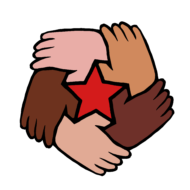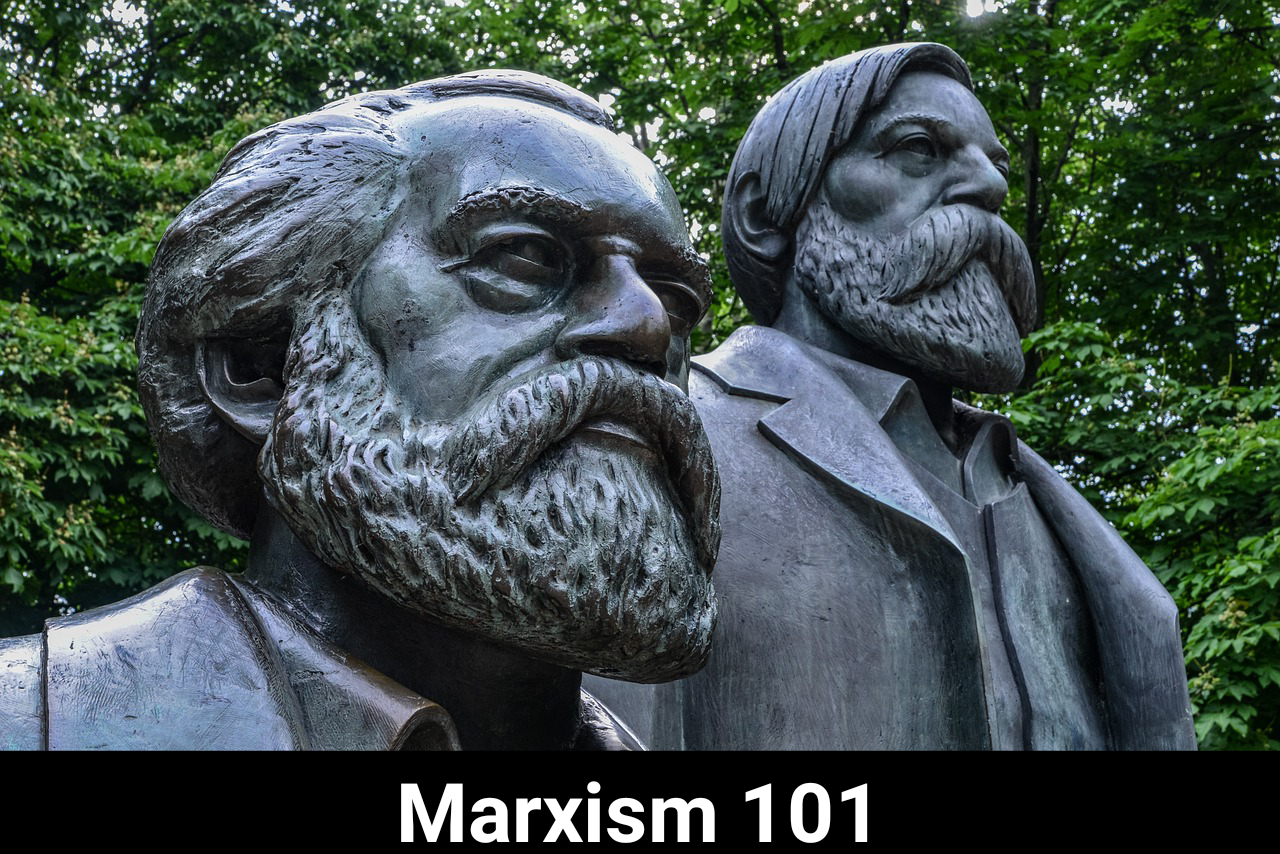Marxism, aka Scientific Socialism, is a field of study first developed by Karl Marx and Friedrich Engels in the 19th Century, which continues to develop to this day.
Before Karl Marx, all attempts at socialism had been utopian. That is to say that people conceived of some ideal society in their mind and attempted to recreate it on Earth, regardless of whether the laws of economic and social life or the present material conditions made it possible.
Marx flipped this on its head and started with the actual physical conditions of economic and social life, as they were, and in doing so demonstrated the instability and exploitation inherent in the Capitalist system, as well as the ways in which its development was preparing society for the transition to socialism.
Marxism is Materialist
Marxism holds material reality as existing first and foremost, independent of the thoughts of people. It holds that before thought or any other phenomena can exist, matter must first exist in a form that would make it possible.
This is in opposition to the idealist world outlook, which asserts that spirit, thought, or some other unknowable force that’s outside of the material world, shapes material reality. To the idealist, the world is shaped by thought, whereas to the materialist, thought only shapes the world insofar as it causes people to take actions in their real, material life.
“It is not the consciousness of men that determines their existence, but their social existence that determines their consciousness.” – Karl Marx, Preface to A Contribution to the Critique of Political Economy
Marxism is Dialectical
Marxism holds that nothing exists in isolation; that all things are affected by, and effect, the other things that they interact with. It also holds that everything that exists is in a constant state of motion and development, that nothing is completely static or unchanging.
Marxists see this constant process of change as being driven by the internal instability of phenomena. All things that exist contain internal contradictions: that is, internal forces which oppose each other and push against each other.
Lords and their serfs together form the feudal system and act as opposing forces within it. The lords want to receive as much goods and labour from their serfs as possible, while the serfs want to keep as much of their produce and time for themselves as possible. The constant political struggle of the two groups against each other shapes the legal obligations and informal agreements that govern their ever changing economic life.
A predator’s existence depends on the availability of prey, and it must continually shape its behaviour in a way that allows it to catch enough prey to survive and reproduce. Likewise, the prey animal must continually adapt their behaviour to minimise their chance of being eaten. The continuous pressure that each puts upon the other drives the predator-prey relationship forward, by forcing them both to continually adapt. If either is too successful, then the predator-prey relationship will end, because neither can exist as predator or prey without the other.
The Materialist Conception of History
Marxists combine this materialist and dialectical thinking in their examination of how societies develop. While other thinkers may propose that society is shaped by the ideas of the time, Marxists start our examination of society and history by looking at the material circumstances of the people living within those societies.
Before people can produce any culture or ideology, they first have to produce for their material needs. Without first securing food and shelter, there can be no social life. But the way in which people provide for their material needs shapes who they are, and how they provide for their material needs is dependent upon the form of economy they find before them.
“The way in which men produce their means of subsistence depends first of all on the nature of the actual means of subsistence they find in existence and have to reproduce. This mode of production must not be considered simply as being the production of the physical existence of the individuals. Rather it is a definite form of activity of these individuals, a definite form of expressing their life, a definite mode of life on their part. As individuals express their life, so they are. What they are, therefore, coincides with their production, both with what they produce and with how they produce. The nature of individuals thus depends on the material conditions determining their production.” – Karl Marx, The German Ideology, Chapter One
“In the social production of their existence, men inevitably enter into definite relations, which are independent of their will, namely relations of production appropriate to a given stage in the development of their material forces of production. The totality of these relations of production constitutes the economic structure of society, the real foundation, on which arises a legal and political superstructure and to which correspond definite forms of social consciousness. The mode of production of material life conditions the general process of social, political and intellectual life. It is not the consciousness of men that determines their existence, but their social existence that determines their consciousness.” – Karl Marx, Preface to A Contribution to the Critique of Political Economy
But if the politics and ideas of a society are primarily determined by its economic relations, how do societies ever change and evolve? How does a society move from feudal relations and the Divine Right of Kings, to a Liberal capitalist society with formal equality before the law?
The way that people produce goods and services doesn’t remain static but continues to change as new technology and methods of production become established in the economy. It’s this changing economic base that is the primary driver of social change. Not only does it change the way that people live and relate to each other in their economic life but, at some point, the new structure of the economy will no longer be compatible with the legally established rules of life.
“At a certain stage of development, the material productive forces of society come into conflict with the existing relations of production or – this merely expresses the same thing in legal terms – with the property relations within the framework of which they have operated hitherto. From forms of development of the productive forces these relations turn into their fetters. Then begins an era of social revolution. The changes in the economic foundation lead sooner or later to the transformation of the whole immense superstructure [the society built on top of the economy.]” – Karl Marx, Preface to A Contribution to the Critique of Political Economy
Class Conflict
“Class” is probably one of the first words that springs to mind when somebody mentions Marxism. It’s commonly understood that Marxism has something to do with class conflict, and the desire to eliminate social classes. This is correct insofar as it goes.
Marxists define class as the relationship a person has to the Means of Production (the farms, machines, tools, and raw materials etc. The stuff that’s used to produce stuff.)
Looking back at the history of human society, we can see that the history of all societies so far has been the history of class conflict. From the introduction of the gendered division of labour, society has been broken into social groups: into exploiters and exploited. The form of this exploitation has changed over time, going through slavery and serfdom, until now, when we find ourselves as the wage slaves of those who own the economy. These different forms of exploitative economic relationship have reflected the ever developing technology and education available in the economy.
The nature of the class struggle at any time is a reflection of the way in which people produce their material life: a feudal economy leads to a struggle between lords, serfs, guilds, and menial laborers; a capitalist economy leads to a struggle between capitalists and proletarians.
The exploited have always wanted more equitable treatment, while the exploiters have always wanted to exploit them as much as possible. Class conflict is inevitable for as long as class based society exists.
The End of Class Conflict
Though class-based society has been around since people abandoned hunter gathering and adopted the division of labour, that doesn’t mean people are destined to be divided into classes forever. In fact, the development of bourgeois (capitalist) society has helped to create the conditions necessary for ending class society altogether.
Previous societies all had complex class hierarchies, where comparatively small groups struggled independently against each other to gain advantages. For example, a craft guild in the middle ages fought for the advantage of only its own members, or else guilds worked together as a group to secure their rights, separate from those of people labouring in the fields or doing menial work in the towns, and separate too from the retainers of the nobility.
Capitalism has broken down these complex class hierarchies, leaving two classes to make up the overwhelming majority of society: the bourgeoisie (those who own the Means of Production and profit from the labor of others,) and the proletariat (those who have to sell their labour in order to live, because they don’t own their own Means of Production).
At the same time, by bringing people together to work in towns and huge workplaces, as opposed to the tiny workshops or home work of the past, capitalism has socialized the labour process. It’s brought the proletariat together physically, making it easier for us to join together and fight for our class interests. The socialized labour process has also made it easy for us to take communal ownership, in a way that was near impossible during the age of peasant farmers and small workshops.
In taking the economy into public ownership, we make it possible to eliminate social classes, and in doing so eliminate all exploitation of one group of people by another.
“In place of the old bourgeois society, with its classes and class antagonisms, we shall have an association, in which the free development of each is the condition for the free development of all.” – Karl Marx and Frederich Engels, The Communist Manifesto
Finally, we’ll be able to run the economy for the common good, instead of doing what profits a few the most.
Return to: Marxism 101 Course





